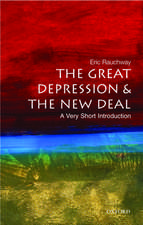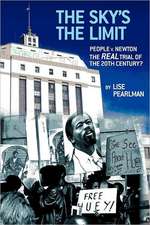The Weight of Vengeance: The United States, the British Empire, and the War of 1812
Autor Troy Bickhamen Limba Engleză Paperback – 13 apr 2017
| Toate formatele și edițiile | Preț | Express |
|---|---|---|
| Paperback (1) | 243.93 lei 31-37 zile | |
| Oxford University Press – 13 apr 2017 | 243.93 lei 31-37 zile | |
| Hardback (1) | 190.35 lei 31-37 zile | |
| Oxford University Press – 21 iun 2012 | 190.35 lei 31-37 zile |
Preț: 243.93 lei
Preț vechi: 276.03 lei
-12% Nou
Puncte Express: 366
Preț estimativ în valută:
46.68€ • 50.86$ • 39.33£
46.68€ • 50.86$ • 39.33£
Carte tipărită la comandă
Livrare economică 12-18 aprilie
Preluare comenzi: 021 569.72.76
Specificații
ISBN-13: 9780190217815
ISBN-10: 0190217812
Pagini: 344
Ilustrații: 27 illus.
Dimensiuni: 145 x 226 x 25 mm
Greutate: 0.45 kg
Editura: Oxford University Press
Colecția OUP USA
Locul publicării:New York, United States
ISBN-10: 0190217812
Pagini: 344
Ilustrații: 27 illus.
Dimensiuni: 145 x 226 x 25 mm
Greutate: 0.45 kg
Editura: Oxford University Press
Colecția OUP USA
Locul publicării:New York, United States
Recenzii
A well-researched work, Bickham's book places the conflict in a transatlantic framework, comparing and contrasting British and American motivations, attitudes, and perceptions.
Bickham accomplishes a lot in this volume...Well written and occasionally provocative. Highly recommended.
A provocative, behind-the-scenes look at the machinations of empires, this excellent history will appeal to all interested readers.
[Bickham] argues rightly that the war involved a commercial struggle within the Atlantic world as well as a struggle to dominate North America. Behind the ostensible casus belli - e.g., the impressment of sailors from American ships by the Royal Navy - was a clash between America's expansion and Britain's efforts to avenge an earlier defeat by making a former colony a client state.
Authoritative, up-to-date, and readable... Modern scholarship at its very best.
Densely-researched and fascinating ... If the American Revolution was fought for a national existence, the War of 1812 was fought for a national validity - the "certain rank" James Monroe invoked in dealings with the fractious British diplomats who sought to codify the new nation as a permanent junior partner on the world stage. The fight for that rank was carried out far more importantly in the press of the day than on the limited battlefields of the war itself, and Bickham, by exploring that fight, has made an invaluable contribution to our understanding of Mr. Madison's War.
Through eight chapters of lively narrative that alternate between the perspectives of Britain and those of the United States, Bickham stays true to his central premise that the United States fought the War of 1812 to force Britain to respect American national sovereignty, while the British fought to maintain the right to ignore it . Bickham spins a good yarn.
Well-researched... Bickham's deft juggling of imperial and national complexities is certain to make The Weight of Vengeance an important contribution to the historiography of the War of 1812.
Bickham's account of the peace negotiations [is] the best I have read.
An interesting and well-written book that throws light on one of the most complex wars in America's history, at once the last stage of the rejection of British power and the first major war of American imperialism.
The War of 1812 still raises patriotic hackles in some quarters today, far more so that the American Revolutionary conflict. For a long time a cool, authoritative, mid-Atlantic voice has been needed, addressing far wider issues than are considered by the many existing naval and military studies. Troy Bickham has provided this with a thorough analysis of the motivations and capabilities of America, Britain and Canada. Here is the full story behind the decisions and events, from the pre-war period when all three combatants underestimated each others' resolve, to the peace signed at Ghent in 1814 between two politically- fragile governments. This astute and nuanced book will now be central to our understanding of this conflict.
The War of 1812, after decades of neglect, is again interesting historians. Yet Troy Bickham, by placing the war in a global context and showing that it mattered for Britain as well as Canada and the United States, brings fresh perspectives to the subject. His new insights, and his clear and accessible prose, make this an important contribution to a growing literature on an important war.
Troy Bickham's splendidly balanced account of the War of 1812 explores how the British as well as the Americans allowed partisan politics and jingoistic emotion to spark a war that need not have occurred.
Engagingly written and full of new information, Troy Bickham's The Weight of Vengeance fittingly commemorates the 200th anniversary of the War of 1812. Bickham's account, highly original yet judicious, shows how military strategy reflected the public opinion of the combatants: U.S., Canadian, and British.
As [Bickham's] analysis proceeds, a decisive view of the war becomes increasingly clear
In The Weight of Vengeance, Troy Bickham counters that conventional wisdom, arguing that the war "was not militarily, strategically, or emotionally a peripheral event for Britain and its empire.
Based on extensive investigation of primary sources, this book contains pensive theses and provides much context about the salient trans-Atlantic facets of the forgotten War of 1812...This elegantly written book will become a classic in the field.
Bickham accomplishes a lot in this volume...Well written and occasionally provocative. Highly recommended.
A provocative, behind-the-scenes look at the machinations of empires, this excellent history will appeal to all interested readers.
[Bickham] argues rightly that the war involved a commercial struggle within the Atlantic world as well as a struggle to dominate North America. Behind the ostensible casus belli - e.g., the impressment of sailors from American ships by the Royal Navy - was a clash between America's expansion and Britain's efforts to avenge an earlier defeat by making a former colony a client state.
Authoritative, up-to-date, and readable... Modern scholarship at its very best.
Densely-researched and fascinating ... If the American Revolution was fought for a national existence, the War of 1812 was fought for a national validity - the "certain rank" James Monroe invoked in dealings with the fractious British diplomats who sought to codify the new nation as a permanent junior partner on the world stage. The fight for that rank was carried out far more importantly in the press of the day than on the limited battlefields of the war itself, and Bickham, by exploring that fight, has made an invaluable contribution to our understanding of Mr. Madison's War.
Through eight chapters of lively narrative that alternate between the perspectives of Britain and those of the United States, Bickham stays true to his central premise that the United States fought the War of 1812 to force Britain to respect American national sovereignty, while the British fought to maintain the right to ignore it . Bickham spins a good yarn.
Well-researched... Bickham's deft juggling of imperial and national complexities is certain to make The Weight of Vengeance an important contribution to the historiography of the War of 1812.
Bickham's account of the peace negotiations [is] the best I have read.
An interesting and well-written book that throws light on one of the most complex wars in America's history, at once the last stage of the rejection of British power and the first major war of American imperialism.
The War of 1812 still raises patriotic hackles in some quarters today, far more so that the American Revolutionary conflict. For a long time a cool, authoritative, mid-Atlantic voice has been needed, addressing far wider issues than are considered by the many existing naval and military studies. Troy Bickham has provided this with a thorough analysis of the motivations and capabilities of America, Britain and Canada. Here is the full story behind the decisions and events, from the pre-war period when all three combatants underestimated each others' resolve, to the peace signed at Ghent in 1814 between two politically- fragile governments. This astute and nuanced book will now be central to our understanding of this conflict.
The War of 1812, after decades of neglect, is again interesting historians. Yet Troy Bickham, by placing the war in a global context and showing that it mattered for Britain as well as Canada and the United States, brings fresh perspectives to the subject. His new insights, and his clear and accessible prose, make this an important contribution to a growing literature on an important war.
Troy Bickham's splendidly balanced account of the War of 1812 explores how the British as well as the Americans allowed partisan politics and jingoistic emotion to spark a war that need not have occurred.
Engagingly written and full of new information, Troy Bickham's The Weight of Vengeance fittingly commemorates the 200th anniversary of the War of 1812. Bickham's account, highly original yet judicious, shows how military strategy reflected the public opinion of the combatants: U.S., Canadian, and British.
As [Bickham's] analysis proceeds, a decisive view of the war becomes increasingly clear
In The Weight of Vengeance, Troy Bickham counters that conventional wisdom, arguing that the war "was not militarily, strategically, or emotionally a peripheral event for Britain and its empire.
Based on extensive investigation of primary sources, this book contains pensive theses and provides much context about the salient trans-Atlantic facets of the forgotten War of 1812...This elegantly written book will become a classic in the field.
Notă biografică
Troy Bickham is an Associate Professor of History and a Ray A. Rothrock Fellow in the College of Liberal Arts at Texas A&M University. He is the author of Making Headlines: The American Revolution as Seen Through the British Press and Savages within the Empire.










